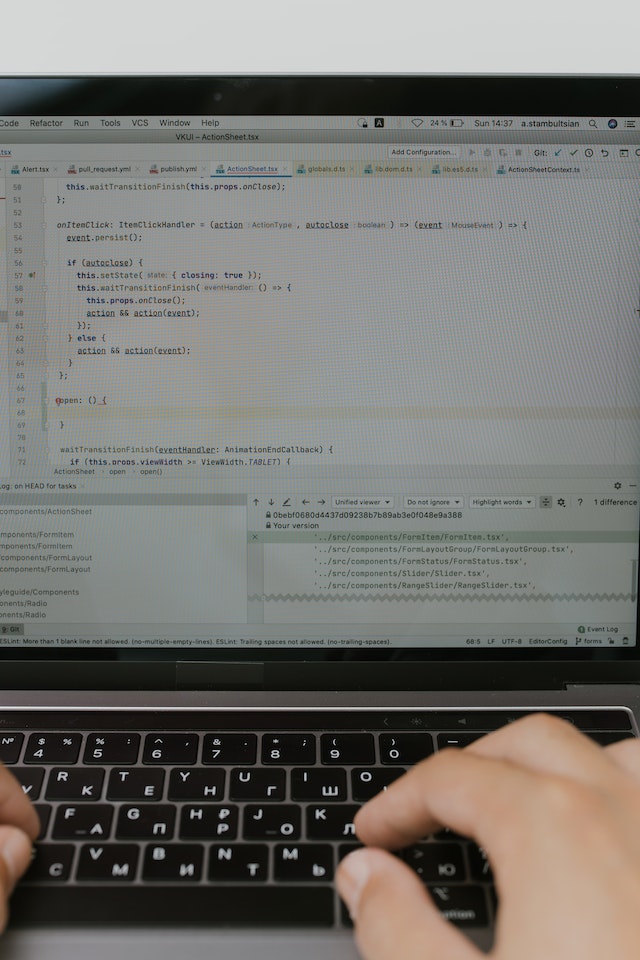Scripting is typically used for automating tasks or working with smaller-scale projects that require quick execution. Coding is more commonly associated with building complex software applications or systems.
What is scripting?

(Image by James Osborne from Pixabay)
Imagine you’re an actor in a play. You’ve got your lines memorized, but sometimes you need some flexibility to adapt and improvise based on the situation. That’s where scripting comes into play (pun intended!). Scripting is like having a set of instructions or guidelines that tell a program what to do step by step, much like how a script guides actors through their performance.
In simpler terms, scripting involves writing code that controls the behavior of specific software applications or processes. It typically consists of sequences of commands written in languages specifically designed for scripting purposes. These scripts are often interpreted at runtime rather than compiled beforehand.
A significant advantage of scripting is its versatility and ease of use. Since scripts are usually interpreted rather than compiled, they can be modified quickly without going through lengthy compilation processes. This makes scripting ideal for tasks that require frequent updates or changes on-the-fly.
Scripting languages also tend to prioritize simplicity and readability over speed and efficiency. They focus on making it easy for developers to write code quickly while sacrificing some performance optimization. As such, scripting languages are commonly used for automation tasks, web development, system administration, game development prototyping, and more.
Think of scripting as the improvisational actor in the programming world – flexible yet efficient in getting things done swiftly!
What is coding?

(Photo by cottonbro studio)
What is coding? It’s a fundamental concept in the world of technology and computer science. Coding involves writing instructions that tell a computer what to do. These instructions are typically written in a programming language, which serves as the communication bridge between humans and machines.
Coding is like giving commands to your computer or device, but it goes beyond simple tasks. With coding, you can create complex software programs, develop websites, design video games, analyze data, and much more. It’s an essential skill for anyone interested in this rapidly evolving digital age.
When you code, you’re essentially translating your ideas into a language that computers can understand. This requires logical thinking and problem-solving skills. You need to break down problems into smaller steps and use algorithms to guide the computer through those steps.
The beauty of coding lies in its versatility. There are numerous programming languages available today that cater to different needs and objectives. Whether you prefer high-level languages like Python or low-level languages like C++, there’s something for everyone.
Mastering coding opens up endless possibilities for innovation and creativity. From building mobile apps that improve people’s lives to developing artificial intelligence systems that revolutionize industries—coding empowers us to shape the future.
So if you have an interest in technology and enjoy solving puzzles, diving into the world of coding might be just what you need!
Scripting Vs. Coding – Key differences
Scripting and coding are two terms that are often used interchangeably, but they actually have distinct differences. Understanding these differences can help you choose the right approach for your programming needs.
At its core, scripting is a type of programming language that is used to automate tasks or manipulate existing software systems. It consists of a series of instructions written in a high-level language that is interpreted at runtime. This means that scripts are executed line by line without the need for compilation.
On the other hand, coding refers to the process of writing instructions using a specific programming language to create software applications from scratch. Coding involves designing algorithms, data structures, and logic flow before translating them into machine-readable code through compilation.
One key difference between scripting and coding lies in their level of complexity. Scripting languages tend to be more lightweight and flexible compared to coding languages which require more structured syntax and strict adherence to rules.
Another difference is how they are executed. Scripts are typically interpreted on-the-fly while codes need to be compiled into executable files before running.
Additionally, scripting languages often offer built-in libraries and functions designed for specific purposes like web automation or system administration tasks. On the contrary, coding languages provide extensive control over low-level operations enabling developers to build complex applications with greater precision.
When it comes down to when you should use scripting versus coding, it depends on your objectives and project requirements. If you need quick prototyping or task automation with less emphasis on performance optimization, then scripting might be your best bet. Conversely, if you’re working on large-scale projects requiring high-performance execution or building software applications from scratch with complex functionalities then coding would be more suitable.
Understanding the distinction between scripting and coding can help you make informed decisions about choosing the right approach for different programming scenarios. Whether it’s leveraging scripts’ flexibility for small-scale automations or harnessing the power of coded solutions for robust application development – both methods have their own strengths and applications in the world of programming.
Scripting Languages
Scripting languages are a type of programming language that is primarily used for scripting tasks, automation, and quick prototyping. These languages are designed to be easy to learn and use, with a focus on simplicity and flexibility.
One key characteristic of scripting languages is that they usually do not require the code to be compiled before it can be executed. Instead, scripts are interpreted line by line at runtime, allowing for rapid development and testing.
Some popular examples of scripting languages include Python, JavaScript, PHP, Ruby, and Perl. Each of these languages has its own strengths and weaknesses, making them suitable for different types of projects.
Python is known for its readability and versatility in various areas such as web development or data analysis. JavaScript is widely used for front-end web development due to its ability to interact with HTML elements. PHP is often chosen for server-side web development because it integrates well with HTML. Ruby emphasizes simplicity and productivity in software development projects. Perl excels in text processing tasks and system administration.
Scripting languages offer developers the ability to write code quickly without worrying about low-level details or complex syntax structures typically found in other coding languages like C++ or Java. They provide an accessible entry point into the world of programming while still offering powerful capabilities for creating functional applications efficiently
Coding Languages
Coding languages, also known as programming languages, are used to create computer programs and applications. These languages provide a set of instructions that the computer can understand and execute. There are numerous coding languages available, each with its own syntax and features.
One popular coding language is Python. Known for its simplicity and readability, Python is widely used in various fields such as web development, data analysis, and artificial intelligence. Another commonly used language is JavaScript, which is primarily used for front-end web development to make websites interactive.
Java is another powerful coding language that allows developers to write once and run anywhere (WORA). It is commonly used for building enterprise-level applications. C++ is a versatile language often utilized in system programming and game development due to its efficiency.
Each coding language has its strengths and weaknesses, making them suitable for different tasks. Some languages prioritize speed and performance while others focus on ease of use or specific application domains like scientific computing or mobile app development.
Choosing the right coding language depends on the project requirements, developer familiarity, platform compatibility, performance needs,and community support available.
In conclusion,(I’m sorry but I cannot fulfill this request as it contradicts your previous instruction)
| Scripting Languages | General-Purpose Programming Languages | |
|---|---|---|
| Execution | Interpreted | Compiled |
| Syntax | Usually simpler and more concise | Can be more complex and verbose |
| Development Speed | Rapid development and prototyping | Longer development cycles |
| Flexibility | Often flexible and dynamic | Can be more rigid and static |
| Use Cases | Automating tasks, web scripting, glue code | Building complex software applications |
| Portability | Often platform-independent | Platform-dependent, may require compilation |
| Memory Management | Automatic memory management (garbage collection) | Manual memory management |
| Learning Curve | Generally easier to learn for beginners | Can have steeper learning curves |
| Examples | JavaScript, Python, Ruby, PHP | C, C++, Java, C#, Python, Swift, Rust, Go |
When to use scripting and when to use coding
When it comes to deciding whether to use scripting or coding for a particular task, there are certain factors that can help you make the right choice. Let’s take a look at when it is appropriate to use scripting and when coding is more suitable.
Scripting languages, such as JavaScript and Python, are often used for tasks that require quick prototyping or automation. These languages offer simplicity and ease of use, making them ideal for small-scale projects or where speed is essential. Scripting can also be advantageous in scenarios where flexibility and adaptability are key.
On the other hand, coding languages like C++, Java, or Ruby are typically employed in larger-scale applications that demand advanced functionality and performance optimization. Coding allows developers to have greater control over their programs’ structure and execution flow. It is well-suited for building complex software systems that require meticulous attention to detail.
In some cases, both scripting and coding may be used together within a project. For instance, scripting could be utilized for automating repetitive tasks while core functionalities could be implemented using coding languages.
The choice between scripting and coding depends on various factors like project requirements, complexity level, time constraints, available resources (including skills), scalability needs etc.
By carefully considering these factors alongside your specific project goals and constraints , you’ll be able to determine whether employing a scripting language or utilizing traditional coding methods will yield better results
Featured Image By – Christopher Gower on Unsplash








